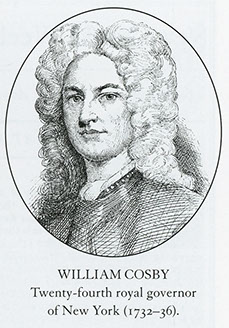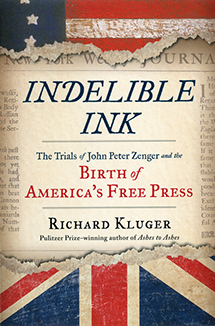Indelible Ink
The Trials of John Peter Zenger
and the Birth of America’s Free Press
About the Book
Published 2016 by W.W. Norton & Co.
An Editor’s Choice Selection of the New York Times Book Review
The liberty of written and spoken expression has been fixed in the firmament of American social values since our nation’s beginning – the government of the United States was the first to legalize free speech and a free press as fundamental human rights. But when the British began colonizing the New World, strict censorship was the iron rule of the realm. Any words, true or false, that were thought to disparage the government were prejudged as a criminally subversive and duly punishable threat to law, order, and the peace of the kingdom. Even after Parliament lifted licensing requirements for all printed material late in the seventeenth century, publishers did not escape the crown’s strict scrutiny and prosecution if they dared criticize their rulers.
So in 1733, when a small newspaper, The New-York Weekly Journal, printed scathing articles that assailed and mocked the new British governor, William Cosby, as corrupt and abusive of his power, colonial New York was scandalized – but hardly displeased. The paper’s publisher, a previously impoverished print shop owner named John Peter Zenger, with a wife and six children to feed, in fact had no hand in his paper’s vitriolic content; he was only the front man for Codby’s two most impassioned adversaries, New York Supreme Court Chief Justice Lewis Morris and his collaborator James Alexander, a shrewd and highly successful attorney.
 While Morris and Alexander, with fame and fortune to lose if convicted for seditiously libeling the colony’s royal governor, bankrolled the paper but remained in the shadows, Zenger became the venture’s courageous fall guy as Cosby brought the full force of his high office down upon the Journal and its publisher. Jailed for the better part of a year, Zenger faced a jury in New York’s City Hall on August 4, 1735, a court proceeding matched in importance during the colonial period only by the Salem witch trials.
While Morris and Alexander, with fame and fortune to lose if convicted for seditiously libeling the colony’s royal governor, bankrolled the paper but remained in the shadows, Zenger became the venture’s courageous fall guy as Cosby brought the full force of his high office down upon the Journal and its publisher. Jailed for the better part of a year, Zenger faced a jury in New York’s City Hall on August 4, 1735, a court proceeding matched in importance during the colonial period only by the Salem witch trials.
In Indelible Ink, social historian Richard Kluger re-creates in rich and engaging detail the dramatic clash of powerful antagonists that marked the beginning of press freedom in America and its role in vanquishing colonial tyranny. Here is an enduring lesson that redounds to this day on the vital importance of free public expression as the underpinning of true democracy and the key to an informed electorate.

©2017 Richard Kluger